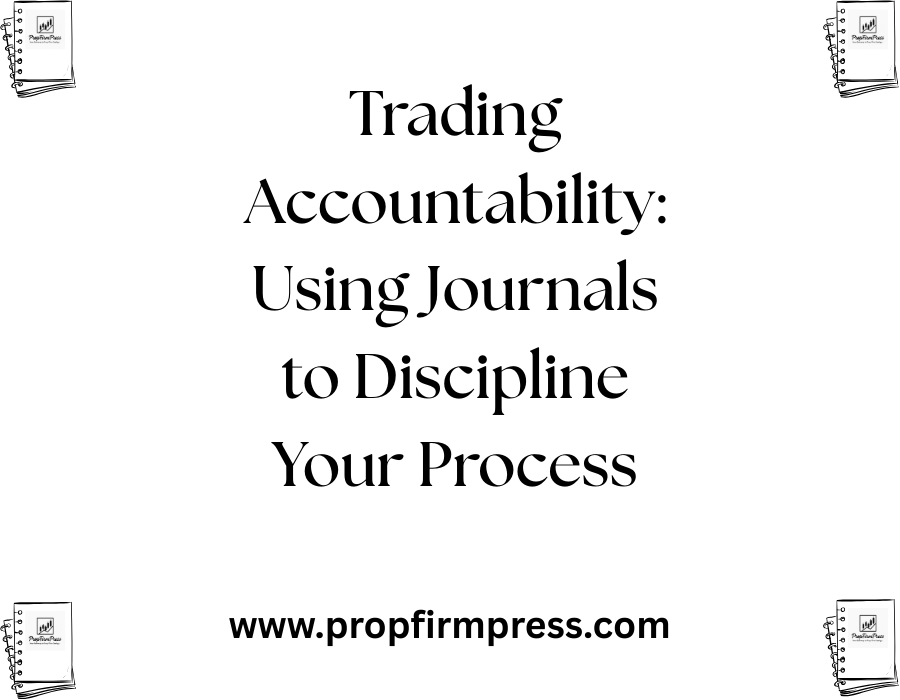Trading Accountability_ Using Journals to Discipline Your Process (2)
Maintaining discipline in trading is foundational to consistent success. Traders face volatile markets, emotional highs and lows, and a barrage of decisions each day. Without a structured approach to accountability, even the most skilled traders can drift away from their edge. One powerful tool for instilling discipline is the trading journal. This article dives deeper into how maintaining a detailed trading journal can boost accountability and transform your trading process.
Why Accountability Matters in Trading
Accountability means owning your decisions and learning from them rather than shifting blame to external factors. In trading, this means recognizing the importance of tracking every trade—both winners and losers—and understanding the rationale behind each move. Traders who lack accountability often repeat mistakes, chasing losses or deviating from their original strategies. By committing to a journal, you embed a system that forces honesty and reflection, key components for evolving as a trader.
Building the Habit: Daily Journal Entries
The power of a trading journal lies in consistency. Making daily entries creates a routine that promotes self-awareness. Each entry should capture details such as the instruments traded, entry and exit points, position sizes, and trade rationale. But it also goes beyond numbers—notes about your mental and emotional state provide insights that are typically invisible in a simple P&L statement. Over time, this habit unveils patterns in your behavior and decision-making that either contribute to your success or derail it.
Beyond Numbers: Qualitative Data in Journals
Quantitative data—such as profit, loss, and trade duration—will reveal some aspects of your performance. However, qualitative data adds depth. Recording your thoughts before placing a trade, your confidence level, reasons for entering or exiting, and even distractions you faced builds a comprehensive picture. This qualitative information often uncovers emotional biases or situational factors affecting your trading that numbers alone cannot highlight. Recognizing these elements is crucial for refining your approach.
Using Technology to Enhance Your Trading Journal
While traditional pen and paper journals work well, leveraging digital tools can further boost accountability. Spreadsheet software, specialized journaling apps, and automated trade tracking platforms allow easy data input and analysis. Many solutions provide visualizations like equity curves and statistical breakdowns, making it simpler to identify weaknesses and strengths. Additionally, cloud-based journals offer accessibility from anywhere, ensuring you stay consistent no matter your location.
Reviewing and Reflecting on Journal Entries
Keeping a journal is only half the battle. Periodic reviews transform raw data into actionable insights. Setting aside weekly or monthly sessions to comb through your entries fosters deeper understanding. Look for recurring mistakes such as ignoring stop losses or exiting trades prematurely. Celebrate the trades where you followed your plan perfectly. This reflection not only reinforces positive behavior but also pinpoints specific areas needing improvement. Moreover, it helps you maintain a realistic outlook on your performance.
Accountability Partners and Sharing Your Journal
Another layer of discipline can be added by sharing your journal with an accountability partner or mentor. Opening up your process creates external pressure to stay honest and committed. Feedback from a trusted peer can reveal blind spots and enhance your learning curve. Regular discussions about your trades, based on journal insights, encourage continuous improvement. This collaboration pushes you to maintain structure in your approach and avoids the isolation that can lead to sabotage of your trading goals.
Developing Customized Metrics for Better Discipline
A one-size-fits-all approach rarely works for traders. Tailoring your journal to include metrics that align with your unique strategy increases accountability. These could include tracking adherence to specific entry criteria, maximal allowed drawdowns, or emotional triggers. By quantifying these parameters, your journal becomes a performance dashboard that holds you accountable to your own rules. The clearer and more personalized the standards, the more disciplined your trading process will become.
Overcoming Common Pitfalls When Journaling
Despite its benefits, many traders abandon journaling early due to common challenges. Some find it time-consuming, while others struggle with honesty in entries. To counteract these, keep entries concise but meaningful, focusing on key information rather than exhaustive details. Develop a non-judgmental mindset—view your journal as a tool for growth, not criticism. Automating parts of the process or using templates can reduce burden. Remember, the goal is to cultivate discipline, not perfection.
Integrating Journal Insights Into Your Trading Plan
The ultimate purpose of journaling is to inform and refine your trading plan. Use the patterns and lessons drawn from your journal to update your rules and risk parameters continually. For example, if you notice repeated losses during specific market conditions or mistakes triggered by certain emotions, adjust your plan accordingly. This dynamic feedback loop ensures that your trading remains adaptive, disciplined, and aligned with your evolving skills and market knowledge.
The Long-Term Benefits of Trading Journals
Consistent journaling fosters a disciplined mindset that pays dividends over the long term. It cultivates patience, emotional control, and strategic thinking—the hallmarks of successful traders. Moreover, as your journal archives months or years of trading history, it becomes an invaluable resource for backtesting ideas and tracking progress objectively. This cumulative insight boosts confidence and accountability, empowering you to face market challenges with resilience and clarity.
Trading is not just about strategy; it is about managing yourself in the heat of uncertainty. By embedding journaling into your routine, you create a framework for accountability that guards your discipline and sharpens your edge. Commit to this process, and watch as each journal entry moves you closer to consistent, confident trading performance.
